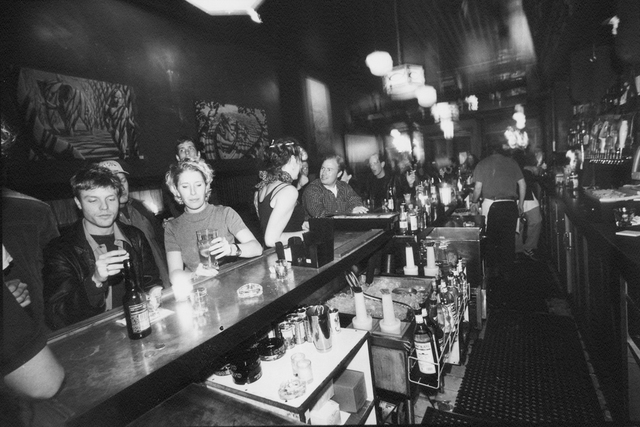The British call them “luvvies”—those theater people who just adore each other, who take every opportunity to fawn all over one another and log-roll on each others’ behalf. Half the fun of the new documentary Moon over Broadway is watching the luvvies turn to haties. The film follows a play, called Moon over Buffalo, through rehearsals, an out-of-town run, and opening night on Broadway. Along the way, the players, the playwright, the director, and the producers find themselves in one standoff after another.
Moon over Broadway
directed by D.A. Pennebaker and Chris Hegedus
starring Carol Burnett, Phillip Bosco
opens Friday at the Broadway Market
The Truman Show
directed by Peter Weir
starring Jim Carrey
now playing at the Meridian, others
D.A. Pennebaker and his collaborator, Chris Hegedus, created The War Room, the 1993 laying-bare of the Clinton campaign that became a kind of star vehicle for the motormouthed James Carville. Moon over Broadway lacks the urgency and the kinetic wit of The War Room; frankly, it lacks James Carville. The star of Moon over Broadway is instead the old-fashioned institution of the Broadway show. I’m not an aficionado, or even that interested in the institution, but this documentary is so fine that I was drawn in, like an amateur anthropologist, observing these strange people and their perilous, expensive act.
The star of the play, and more of a diva than you might expect—albeit a wacky, ear-tugging one—is Carol Burnett, returning to Broadway after a 30-year absence. The play’s director, Tom Moore, is the man who brought you Grease. A small, blond man, he’s a master of diplomacy, as we see at the very first read-through: He phrases his criticisms of Burnett as suggestions—”just an idea!” Moore’s got himself a little conflict between Burnett and Ken Ludwig, the playwright, who had an earlier hit with Crazy for You.
Burnett struggles with Ludwig’s lines, which, in rehearsal at least, don’t seem terribly funny. Ludwig wrote Moon over Buffalo as farce in the tradition, he repeats over and over, of Feydeau—though he confesses to a reporter that he’s tiring of the genre. “My next play won’t have any doors in it,” he promises. Meanwhile, as Burnett applies her broad comic sensibility to his material, Ludwig grows more uncomfortable. He clearly sees himself as the Artiste, and Burnett as the crass face of Commercialism. “This is the pact you make with the devil in the modern theater,” he bitches to the producer. “You need a star to sell tickets.”
This is rich, coming from a man whose play stinks. I’m not a fan of the artifices of theater, and probably farce is the most difficult kind of theater for me to endure, but all caveats aside, this stuff isn’t very funny. A hard-of-hearing character gives rise to an excruciating sketch mixing up the words “hearing aid” and “lemonade.” You get the idea. As we come to recognize the play’s faults, Ludwig’s posturing grows less and less tolerable, and Burnett comes to seem more and more the trouper for her attempts to make his stuff funny. Or funny-ish.
This conflict culminates in a dress rehearsal in New York, giving dramatic emphasis to the tension the whole cast feels on the eve of the play’s opening. A broken winch temporarily brings the show to a halt. Moore tentatively asks Burnett if she could entertain the audience while the winch is fixed. Burnett coolly assents—no problem for an old pro—and goes on stage, earlobe firmly in her rip, to re-create the Q&A session from The Carol Burnett Show. She charms both the stage audience and the movie audience, and reminds us in her showbizzy way about the star’s power to connect.
The Truman Show boasts another star turn. It’s just not the one the media blitz promised us. Jim Carrey is fine, if overstated, in his role as Truman, the unwitting star of the most popular TV show in the world. But Ed Harris is the man who should be attracting all this inflated Oscar talk. The film has achieved the seemingly impossible accomplishment of uniting a Hollywood studio, a big star, and an idea. Hence its popularity with reviewers. The central idea—that Truman’s whole life is a media-manipulated daydream—is meant to resonate as an allegory about how we, too, are all living in a media-manipulated etc. Not terribly punishing stuff, intellectually.
But when Harris appears as Chrystof, the creator of The Truman Show, the material really takes wing. Chrystof found Truman as a baby, built him a world to live in, and peopled that world with actors. Harris plays Chrystof as a kind of entertainment guru, a New Age bringer of light to the people. With his beret and his serene little collarless shirts, he reminded me of no one so much as Jacques Barzaghi, the strategist of Jerry Brown’s 1992 bid for office. The likewise-bereted Barzaghi was (and is) a French philosopher who clothed Brown’s bid for raw power in the language of self-help and positive energy. And that is the particular political fearfulness Harris brings to this role. He makes us see the kind and gentle horror of those who would present fiction as reality.





